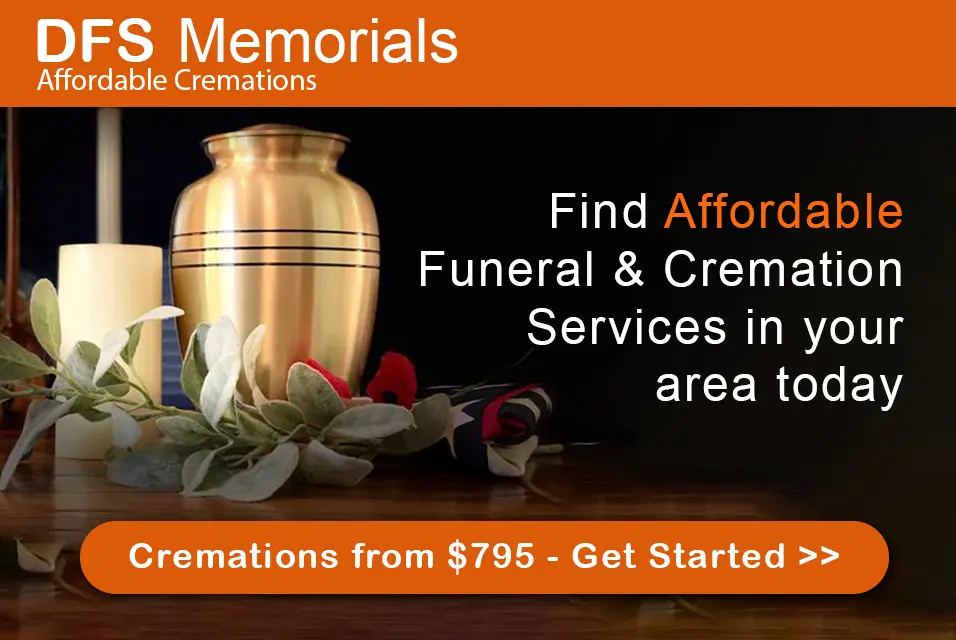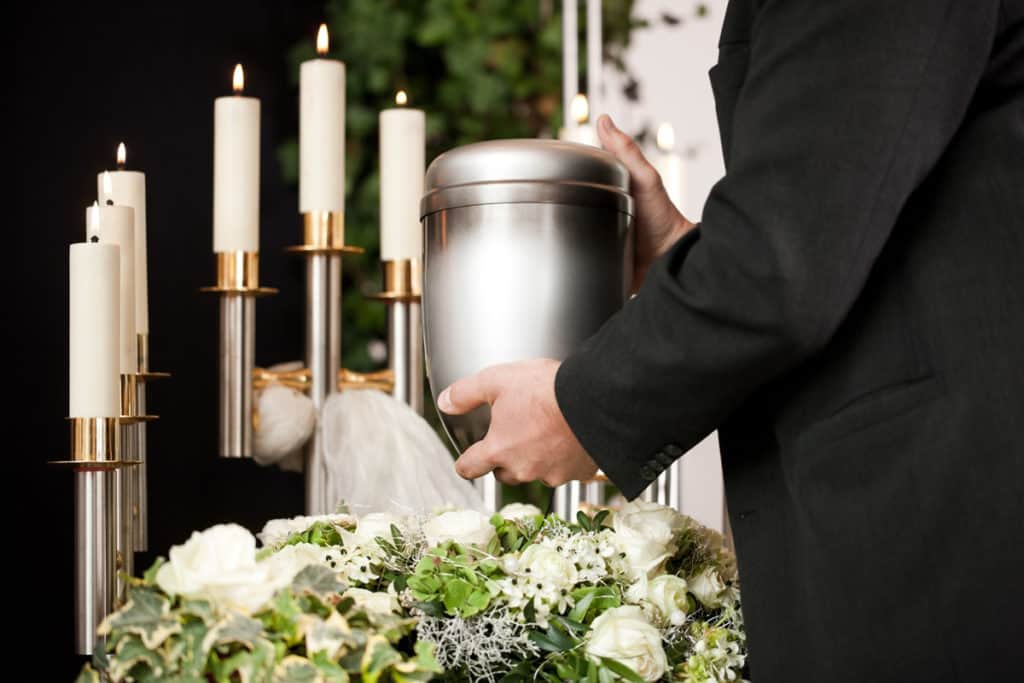This guide aims to answer some key questions about making funeral or cremation arrangements in Minnesota. We provide an overview of some legal aspects of making funeral plans specific to Minnesota funeral laws and what funeral or cremation costs to expect.

Arranging a cremation or funeral is no easy task, especially if it is your first experience with funeral planning. If you want to arrange a simple cremation or find out about cremation costs, we have included some details below and links to local affordable cremation providers.
We cover how Minnesota state law affects your rights as a consumer in the purchasing of funeral services and products, with some useful insights on how you can save money arranging a funeral in Minnesota. Whether you are faced with the immediate need to make funeral arrangements or whether you are researching to preplan, hopefully, you will find this guide a good starting point.
How do you choose which funeral home or cremation provider suits your needs?
Direct Cremation $1,195 Call (612) 915-0972
Direct Cremation $1,195 Call (651) 383-3327
This is one of the first things you need to do—choose a funeral home or cremation provider. We often make a decision in haste because when a death occurs, we feel under pressure to act. Generally, people will choose a funeral home based on recommendations from family, friends, or even the church, hospital, or hospice.
You need to ensure that whoever has suggested a funeral home to you is not biased and is giving you a genuine recommendation. If you have no recommendations or, for whatever reason, need to find a funeral provider from scratch, it can help to decide upon what specific kind of funeral services you are looking for, as this can help to narrow down your selection.
Do you require traditional services, burial, or cremation, or are you seeking something more alternative, such as a green burial?
All funeral establishments in Minnesota must be licensed to operate and comply with the regulations for final disposition according to Minnesota Statutes 149A.
How do I find a funeral home or cremation provider in Minnesota?
Direct Cremation $1,195 Call (320) 262-7177
There are around 645 funeral homes and cremation providers in Minnesota. You can use our directory to locate and view all the funeral companies near you. If you are seeking an affordable direct cremation service, we would suggest you visit DFS Memorials LLC. DFS Memorials is a nationwide network of local low-cost cremation service providers offering a best-value direct cremation service package.
Direct Cremation $1,195 Call (507) 205-2877

Do you want a burial or cremation?
This is a key aspect of arranging a funeral – deciding whether the deceased will be buried or cremated. This IS a personal choice, but burial costs these days can steer people to consider cremation as a less costly funeral option.
The cremation rate in Minnesota is just over 57%, so it is much the same as the national rate in the U.S. Current funeral trends indicate that this is going to increase over the coming years. A funeral where cremation is selected can be conducted just the same as a traditional burial service. Only the deceased is cremated after the service as opposed to buried.
Check out our Ultimate Guide to Cremation to learn more about cremation services, the process, costs, and legalities.
This eliminates the need for many of the expensive funeral items like a casket, burial vault, cemetery plot, and monument. A casket is not required by law for cremation in Minnesota. A rigid alternative container can be used for the purpose of cremation.
Many funeral homes can provide a rental casket for use during a cremation service if required. If a burial is conducted, a disposition permit must be issued, and if a cremation is conducted, a cremation permit must be issued.
What is the cost of a funeral or cremation in Minnesota?
The average cost of a funeral in the U.S. is $7,848 (according to the NFDA – National Association of Funeral Directors 2022), and this does not include any cemetery fees. This generally means that the full cost of a funeral can amount to nearer to $10,000 when cemetery fees are included.
The cost for a funeral can be broken down into several components – the funeral director’s professional service charges, casket, embalming, transportation, and ancillary costs such as flowers, music, prayer cards, obituary, etc.
All funeral homes in Minnesota must have a general price list (GPL) that outlines their service charges and funeral merchandise prices. They must provide a copy of their GPL when they quote you a price according to the Federal Trade Commission’s ‘Funeral Rule.’
When arranging a funeral, you often end up with a range of charges from the GPL in an a la carte style, and this can result in a cost higher than you first imagined. Sometimes choosing a funeral package that offers an inclusive service and pricing can help you manage your overall funeral expenses.
It is recommended that you DO shop around and compare funeral prices between more than one funeral home. That way, you can be sure that you have a “best value” funeral service.
If you are concerned about funeral costs, the DFS Memorials providers in Minnesota offer low-cost cremation services and affordable burial services.
Is embalming required in Minnesota?
No, it is not required by law in Minnesota. However, if a viewing, visitation, or open-casket service is requested, or the funeral will not take place for over 72 hours, embalming may be suggested by your funeral director.
Do note, though, that Minnesota law only states that embalming OR refrigeration is required if a body is stored after 72 hours, and refrigeration can extend this period to 6 days.
If there are any reasons for public health safety, the Commissioner of Health may dictate that embalming is required. Embalming sanitizes the body for the purposes of health and hygiene, but it does not prevent the natural decomposition process from taking place.
If you do not wish to have your loved one embalmed, there is no reason to if you are to hold the funeral or cremation within 6 days and your funeral home has refrigerated storage.
What are my options for purchasing a casket or alternative container?
The Federal Trade Commission’s ‘Funeral Rule’ means that you have the right to purchase a casket from a third-party retailer. You may still wish to select from your funeral home, which must provide you with a Casket Price List (CPL) before showing you any selections.
Up until the introduction of the funeral rule, only funeral homes sold caskets with quite a significant markup. Now you have the choice to purchase a casket in Minnesota from a high street or online casket retailer.
Your funeral home must accept your casket and cannot add a surcharge for handling it. This has brought a flood of cheaper caskets to the marketplace, and you can now purchase a standard casket for $995, generally a saving of around $2,000. Most casket sellers can arrange a next-day delivery to the funeral home.

What are burial and cemetery plot requirements in Minnesota?
There is no law that states that a burial vault must be purchased. However, most cemeteries have regulations that stipulate that some hard retainers protect the gravesite to prevent subsidence and maintain the integrity of the ground. It is more important where heavy machinery is used for maintenance and mowing.
You should carefully check the regulations at the cemetery where you have a plot or are considering a plot. There are also regulations about what type of monument you can erect and the correct period of time to elapse, allowing the gravesite to settle before erecting your monument.
What about a Veteran’s funeral in Minnesota?
There are certain benefits for Veterans (check out our section on Military Funerals for more information), and there is currently space for casketed and cremated remains at the two VA cemeteries in Minneapolis and Little Falls. In the state-run cemetery, spouses’ and dependents’ plots are charged at between $250 and $750.
Can I pre-plan a funeral or cremation? How does Minnesota state law govern preneed plans?
Yes, you can pre-plan a funeral or cremation in Minnesota. Pre-plan arrangements are often referred to as “preneed contracts.” In Minnesota, only a licensed funeral director or mortician sells preneed contracts, and the monies are held in a trust fund.
Planning ahead is an excellent way to remove the stress of decision-making, and the financial burden, on your surviving family. Putting funds into a revocable trust fund can secure this ‘asset’ should you later need an assessment for Medicaid eligibility, whereby up to $6,000 can be allowed in a funeral plan.
With a growing aging population, many senior care and nursing homes now insist on evidence of a funeral plan before admitting new clients.
Another way of preplanning is to set up a Totten Trust or a payable-on-death (POD) account. The beneficiary named and authorized to withdraw upon the account holder’s death can withdraw funds paid into this account.
Read more about Setting up a P.O.D. account to set aside Funds for Funeral Expenses.
This kind of account is exempt from probate. You can document your funeral wishes and even identify a funeral home you wish to handle the services. The important considerations with this kind of preplanning are to ensure that your family is aware of your plan and where it is kept and to revisit and revise it every few years to ensure your funds still meet your requirements.
What are the laws for scattering ashes in Minnesota?
If you wish to scatter ashes, you can do so on private land with the consent of the landowner. You can also scatter on public land so long as you observe some due diligence. Human cremated remains are basically organic elements and pose no risk to the environment.
If you wish to scatter in a public place such as a state park, you should check with the park ordinance. If your scattering does not interfere with any park activities, there should be no issue. You do need to consider that any floral tribute should be entirely biodegradable.
Many state parks will not allow any marker for a scattering site. Likewise, you can scatter and disperse ashes over inland water or Lake Superior, so long as only biodegradable containers/tributes are used.
What help is available with funeral expenses in Minnesota?
It can be extremely distressing to have to deal with a death when you have little if no, money to pay for the funeral. There is limited assistance available. Veterans are entitled to a free cemetery plot and grave marker; you should check with your local VA administration.
There is a lump-sum death benefit of $255 payment from Social Security if you have qualified. Medical Assistance (MA) and Supplemental Security Income (SSI) will usually discount a certain amount prepaid into a funeral plan. This is one benefit of having a funeral plan, and it can be a very good idea to arrange a funeral plan with a local firm.
Each county will have some limited funds to assist with indigent funerals, but these do vary, and you most likely need to be below the poverty line to qualify. Both Hennepin and Benton County have indigent burial assistance programs. You can also contact local charities and Church associations to see what support is available. Remember that DFS Memorials will guide you to your nearest low-cost funeral and cremation provider.

Are whole-body donations permitted in Minnesota?
Yes, you may choose to donate your body to science, and there are two options for donation in Minnesota:
The University of Minnesota Anatomy Bequest Program http://www.med.umn.edu/research/anatomy-bequest-program
The Rochester Mayo Clinic www.mayoclinic.org/body-donation
Alternative Options for a ‘Greener’ Funeral or Eco Disposition.
In our changing times, more families are exploring greener alternatives to a traditional burial or a flame cremation. A natural burial or green burial in a conservation cemetery is certainly one option that offers a natural and environmentally friendly death care final disposition.
Visit our resource section on Natural Burial to locate green burial cemeteries in Minnesota
Alkaline Hydrolysis, also known as water cremation or aquamation, is also legal in Minnesota and offers a much greener cremation alternative. The body is gently dissolved in a steel container using water and an alkaline solution. The remaining bones are ground down (similar to flame cremation), and the family is provided with an urn of remains.
Learn more about Alkaline Hydrolysis, Water Cremation, or Aquamation.
What do you do if your loved one dies away from Minnesota?
If your loved one dies away from Minnesota, you will need the services of a mortuary shipping company to transport the body home. The deceased can be transported by land or air, depending on location, and if using public transportation, certain regulations apply, and documentation must be completed.
It can work out a significant additional expense to the funeral costs, so be sure to thoroughly investigate your options. You will need the services of a funeral professional at the place of death and one in Minnesota.
To learn more, visit our funeral shipping page.
If you do travel regularly for work, pleasure, sport, visiting family, or snow-birding, you may wish to consider our great value Travel Protection Plan. This plan costs just $450 for an individual for lifetime protection against the costly expense of returning a body home if a death occurs 75 miles (or further) from your residence in Minnesota. It also provides global coverage. Domestic funeral shipping can cost from $3,000, and International repatriation can start at around $6,900.
If you do regularly travel for work, pleasure, sport, visiting family, or snow-birding, you may wish to consider our great value Travel Protection Plan. This plan costs just $450 for an individual for lifetime protection against the costly expense of returning a body home if a death occurs 75 miles (or further) from your residence. It also provides global coverage. Domestic funeral shipping can cost from $3,000, and International repatriation can start at around $6,900.
Visit our article on Travel Protection: Your Guide to Affordable Funeral Shipping, or click on the link above to enroll today.
Where do I get a copy of a death certificate in Minnesota?
Minnesota law requires a death certificate to be filed within 5 days of the death or before the burial or cremation. Your funeral director will ordinarily complete this on your behalf. A certified copy of a death certificate can be obtained from the local county registrar or via the Minnesota Department of Health.
The first copy of a certified death certificate costs $13.00, and additional copies are charged at $6.00.
What should you do if you have a complaint about funeral services or products you have purchased?
You have consumer rights when purchasing funeral services and merchandise, just as with any other purchases, and if you have a complaint or grievance that you cannot resolve, you can contact:
Minnesota Funeral Directors Association
Professional Practices Committee,
7046 East Fish Lake Rd,
Maple Grove, MN 55311.
This professional association responds to all inquiries about member firms.
You may also contact the Mortuary Science Unit, Minnesota Dept. of Health, at 717 Delaware Street SE, Minneapolis, MN 55440.
This Department licenses all funeral directors in the state and issues permits for funeral establishments. The regulatory agency that handles consumer complaints is the Attorney General’s Office, Consumer Complaints, 445 Minnesota St., Suite 1400, St. Paul, MN 55101
Alternatively, you may wish to consult with the following:
The Funeral Consumers Alliance of Minnesota (formerly Minnesota Funeral & Memorial Society) is a not-for-profit consumer organization that helps to advocate and protect consumer rights when purchasing funeral services and merchandise in Minnesota.
They can be contacted at:
900 Mt. Curve
Minneapolis, MN 55403
Resources:


